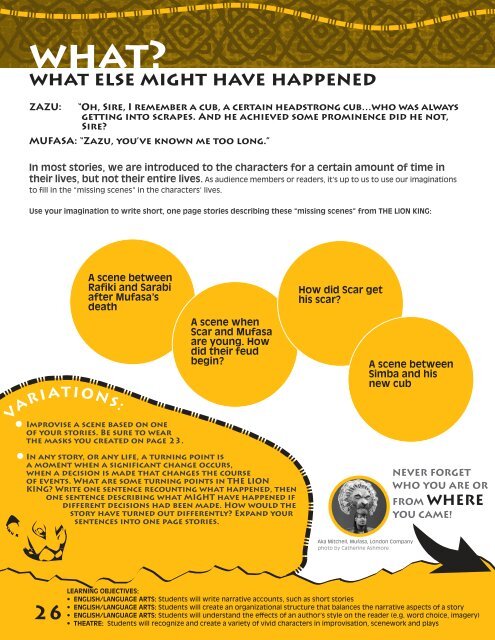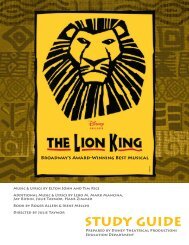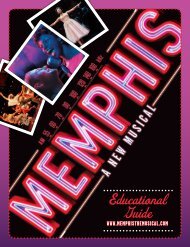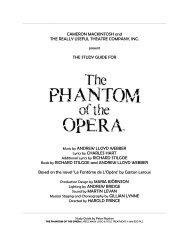The Lion King Study Guide - Telecharge
The Lion King Study Guide - Telecharge
The Lion King Study Guide - Telecharge
Create successful ePaper yourself
Turn your PDF publications into a flip-book with our unique Google optimized e-Paper software.
what?<br />
what else might have happened<br />
ZAZU: “Oh, Sire, I remember a cub, a certain headstrong cub…who was always<br />
getting into scrapes. And he achieved some prominence did he not,<br />
Sire?<br />
MUFASA: “Zazu, you’ve known me too long.”<br />
In most stories, we are introduced to the characters for a certain amount of time in<br />
their lives, but not their entire lives. As audience members or readers, it’s up to us to use our imaginations<br />
to fill in the “missing scenes” in the characters’ lives.<br />
Use your imagination to write short, one page stories describing these “missing scenes” from THE LION KING:<br />
VARIATIONS:<br />
26<br />
A scene between<br />
Rafiki and Sarabi<br />
after Mufasa’s<br />
death<br />
Improvise a scene based on one<br />
of your stories. Be sure to wear<br />
the masks you created on page 23.<br />
A scene when<br />
Scar and Mufasa<br />
are young. How<br />
did their feud<br />
begin?<br />
In any story, or any life, a turning point is<br />
a moment when a significant change occurs,<br />
when a decision is made that changes the course<br />
of events. What are some turning points in THE LION<br />
KING? Write one sentence recounting what happened, then<br />
one sentence describing what MIGHT have happened if<br />
different decisions had been made. How would the<br />
story have turned out differently? Expand your<br />
sentences into one page stories.<br />
How did Scar get<br />
his scar?<br />
A scene between<br />
Simba and his<br />
new cub<br />
Aka Mitchell, Mufasa, London Company<br />
photo by Catherine Ashmore<br />
NEVER FORGET<br />
WHO YOU ARE OR<br />
FROM WHERE<br />
YOU CAME!<br />
LEARNING OBJECTIVES:<br />
• ENGLISH/LANGUAGE ARTS: Students will write narrative accounts, such as short stories<br />
• ENGLISH/LANGUAGE ARTS: Students will create an organizational structure that balances the narrative aspects of a story<br />
• ENGLISH/LANGUAGE ARTS: Students will understand the effects of an author’s style on the reader (e.g. word choice, imagery)<br />
• THEATRE: Students will recognize and create a variety of vivid characters in improvisation, scenework and plays





